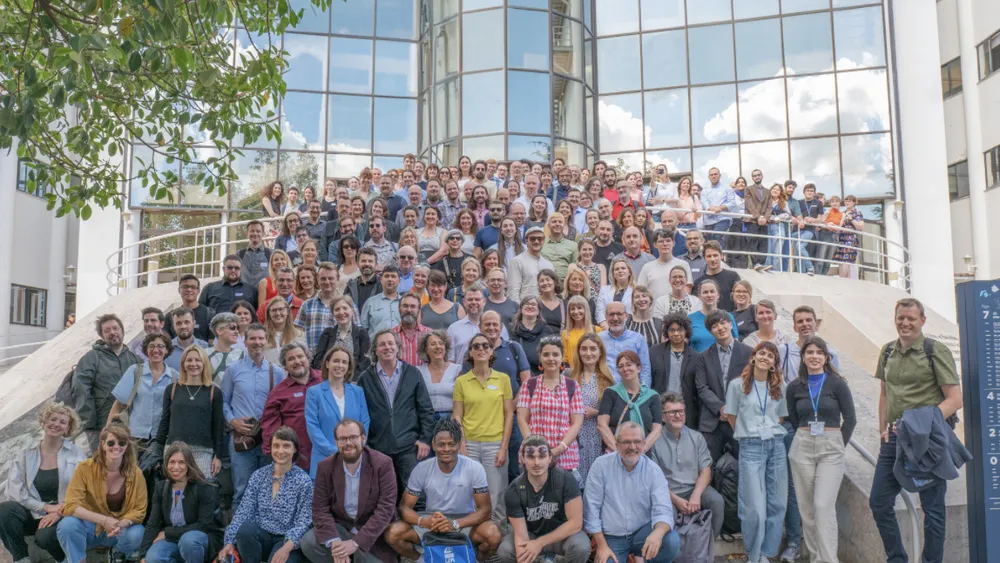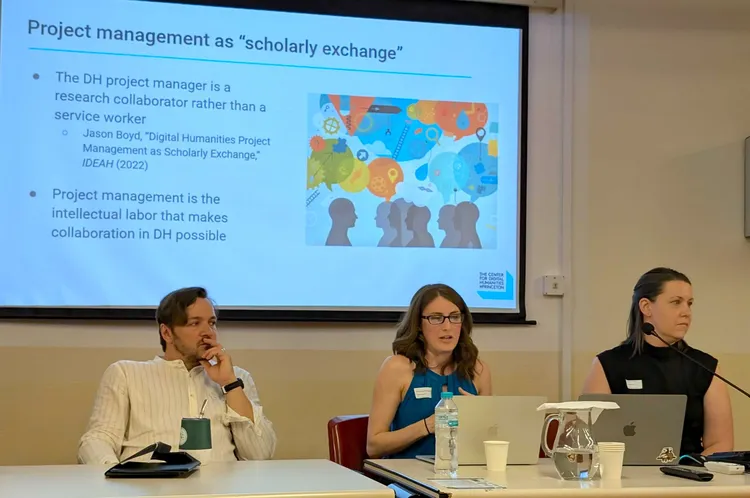Project Management and the Rise of RSEs
6 August 2024
At this year’s DARIAH Annual Event, CDH Project Manager Mary Naydan and Assistant Director Jeri Wieringa discussed the importance of project charters in an era of RSEs.

What role does project management play in a changing digital humanities landscape?
Center for Digital Humanities Project Manager Mary Naydan and Assistant Director Jeri Wieringa tackled this question in a panel on “The RSE Turn in Digital Humanities” at this year’s DARIAH Annual Event in Lisbon, Portugal, held June 19-21.
The panel, moderated by CDH Executive Director Natalia Ermolaev, explored how the DH community has negotiated an important transition: at many institutions, including the CDH, the role of “DH developer” has given way to the position of “Research Software Engineer” (RSE), a term that describes the professional practice of creating and sustaining high-quality, reusable software for research applications.
Though much of the RSE profession is STEM-oriented, the RSE framework has become increasingly adopted and adapted by the arts and humanities community.
The panel brought together members of RSE teams from the CDH, King’s Digital Lab (King’s College, London), TELOTA: The Electronic Life of The Academy (Berlin-Brandenburg Academy of Sciences and Humanities, Germany), and the Digital Humanities Centre at the Institute of Literary Research of the Polish Academy of Sciences (Warsaw) to discuss the impacts, benefits, and challenges of the RSE framework in a DH setting.
Naydan explained that in keeping with the conference theme of “Workflows,” panelists each presented on “one RSE-related workflow” and provided “context about how RSEs and projects function at their various institutions.” Naydan and Wieringa focused on the CDH’s chartering process, which involves the creation of a document that outlines the scope, goals, and timeline of a collaborative DH project.

Mary Naydan and Jeri Wieringa present slides during a panel on “The RSE Turn in Digital Humanities” at this year’s DARIAH Annual Event.
According to Naydan, the project charter has become “more important than ever” as the CDH has “shifted from large-scale development-intensive databases to shorter-term software interventions in larger projects” through our six-month collaborative research grants.
“Chartering, and the support and pedagogy we provide to faculty around the chartering process, is an essential part of defining these small-scale contributions within the new RSE framework, as well as documenting and modeling a collaborative approach to defining and organizing a project,” she noted.
Wieringa shared that the panel and the conversation as a whole provided an important opportunity for DH scholars and practitioners to discuss the RSE role, which is not always well understood within the North American DH community, as well as to share insights on the “turn” from DH developers to RSEs.
“There was a shared understanding . . . that the professionalization of ‘Research Software Engineering’ was a large benefit for those interested in more technical applications of research as it provides a way to legitimate the work and provide a structure for professional advancement that has historically been lacking in the DH developer model,” she explained.
Naydan also noted that the international character of the conference made for particularly interesting comparisons with the CDH project model (DARIAH is a European Research Infrastructure Consortium; the CDH is a cooperating partner).
“Because European humanities faculty must apply for grants from public agencies like the European Research Council to fund their projects, they have to think through their project’s pitch, goals, deliverables, team, and timeline as part of the application process,” she noted. In contrast, because the CDH is “not reliant on external grants,” those questions come later, “as part of the pedagogical work we build into the chartering process.”
Wieringa noticed another important difference across the conference presentations: whereas, in some project models, “the development work (and the RSE teams) could be quite removed from the researchers,” at the CDH, software development is research.
“Because our model of research software engineering frames development as research and as scholarly output, we are able to articulate and advocate for a more academic model for RSE work generally.”
Those interested in learning more will be able to access the panel abstracts and slides via DARIAH.